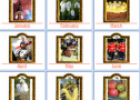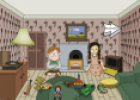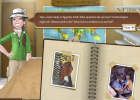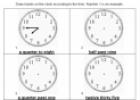Cargando...
Recursos educativos
-
Nivel educativo
-
Competencias
-
Tipología
-
Idioma
-
Tipo de medio
-
Tipo de actividad
-
Destinatarios
-
Tipo de audiencia
-
Creador
Lo más buscado
-

British folklore, legends and superstitions
Tiching explorer Organización
- 1 lo usan
- 4597 visitas
This webpage looks at each month in detail giving our visitors an insight into Britain's past. This resource permits us to discover this country's folk history.
-

Back in time
TESiboard Organización
- 6101 visitas
In this activity we compare toys of today and those of the past. We talk about the difference and similarities between the toys.
-

At a restaurant
Tiching explorer Organización
- 2 lo usan
- 3390 visitas
Activity designed to help us revise verb tenses (present, past). We fill in the blanks using the verb that follows each sentence.
-

Story: American sport legend
Tiching explorer Organización
- 3651 visitas
The resource consists of an interactive book. We learn about the life of a sportsman. We practice the past tense. We improve our listening and reading skills.
-

Learn archaeology
Tiching explorer Organización
- 3806 visitas
In this webpage we explore some mysteries of the past (Egypt, Terra Cota warriors and an underwater shipwreck in the Caribbean sea).
-

Reading a clock
Tiching explorer Organización
- 1 lo usan
- 3008 visitas
Interactive activity designed to help us practice telling the time (half past hours). We need to sign in to the Studyladder website to view the resource
-

Telling the time (2)
ESL Kids Lab Organización
- 4524 visitas
Printable worksheet (PDF). In this activity we practice telling/writing the time (quarter, half past). Draw hands on the clock according to the time.
-

30 irregular verbs
Xtec Organización
- 3688 visitas
Activity designed to help us practice the use of English irregular verbs (past tense). Includes examples, games, pronunciation activities and translations (Spanish).
-

Interpret. Social classes in the 19th century
EduBook Organización
- 2184 visitas
Do you think the differences between social classes are the same today as in the past? Give examples to support your argument.
-

Te estamos redirigiendo a la ficha del libro...













